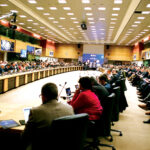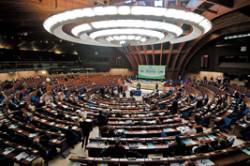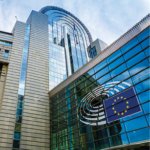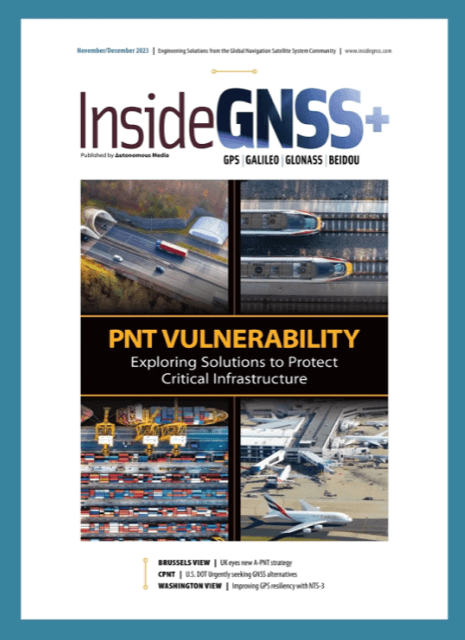At the 12th EU Space Conference in Brussels, Thierry Breton made his first appearance as the new European Commissioner for Internal Market, and a remarkable appearance it was. In his position, Breton is charged with overseeing two of the European Commission’s Directorates General, that of Communications Networks, Content and Technology, also known as DG CONNECT, and Defense Industry and Space, also known, cleverly, as DG DEFIS. In French, defis means “challenges.” DEFIS is a freshly created DG under the new European Commission headed by Ursula von der Leyen.
Space Commissioner Breton arrived at the event with some fanfare and started his presentation with a jaunty air. “I could speak French but I think it’s best if I speak English,” he teased, “even if, not yet but early next month, we will have only 4.8 million inhabitants in Europe for whom their home language is English,”—referring to the Irish—“and for the 504 million remaining citizens it will not be English.”
Once upon a time the lingua franca, literally the French language, was the most popular lingua franca, the common language spoken among people who speak different languages, at least in Europe. With the rise of the Anglo-Saxon hegemony in the last century, English has become the more common common language in many international arenas, including that of EU Space.
Breton suggested, without saying the word Brexit, that some adjustments might need to be made, some other modes of expression explored. And then he did, after all, continue in English.
Teasing Aside
Breton apologized for missing his earlier scheduled time slot at the conference, explaining that he had had to be in Davos in the meeting in which President von der Leyen faced off with Donald Trump. It has been reported that the American President later said the EU was more difficult to do business with than China.
Breton promised to explain why he is not happy. This focused the room’s attention. “You have achieved a fantastic success, I’m extremely impressed, to tell the truth, proud. Galileo, EGNOS, Copernicus, thanks to all of you, we did it.”
Specifically about the European flagship GNSS program, he said “Galileo is now up and running for more than two years. I remember the skepticism at the beginning when this program was launched. While still in its initial service mode, the accuracy of Galileo is beyond what was expected by many, including our American friends.
“Of course we continue to develop Galileo, we have more than one billion users on the planet and this number is growing every day.” Breton said his objectives included continuing deployment in order to reach the full operational capacity as soon as possible, continuing to improve precision and preparing the second generation of Galileo, to stay ahead in the technological race.
“Of course, the transition batch procurement is ongoing,” he said, “and we will also ensure the smooth development of encrypted signals, because Galileo is also a strategic asset designed to be also in use for military and not only civil security purposes.
“I will come back on some governance issues we may have but right now I’m still on the good news part.”
“We need to do more, but differently. It’s a lot of money that we’ve put on the table, so we will need to do a lot of work, but differently. We are not in a business-as-usual environment or mode any longer.”
Money, Honey
The EU is in the midst of a big-time wrangle over its 2021-2027 Multiannual Financial Framework: the EU budget. The slice of the pie that will go to the EU space programs is still very much up in the air. Various actors have expressed concern about those programs, including Galileo, potentially not getting what they need to meet their objectives, including those enumerated by Breton.
Recently cited low-side numbers, some billions short of what the space programs are asking for, were put forward last year by the then-presiding Finnish EU Presidency. During the Space Conference in Brussels, Timo Pesonen, new Director General of DG DEFIS and who also happens to be Finnish, was asked what his compatriots were thinking. He answered, “I can’t read minds so I don’t know what was going on in the thoughts of the Finnish representative when he was proposing this budget, which doesn’t seem to make a lot of sense to me.”
Any way you slice it, there is likely to be some belt-tightening going on across the Union in the coming months and years, with the imminent British pullout bound to have an impact on budget figures, and with some member states reportedly unwilling to increase their spending in order to make up the shortfall.
Breton said, “I just saw my colleague, Commissioner Hahn [Johannes Hahn, Budget and Administration] to make sure that we will be totally in line with the negotiation. It will be tough. You can count on me. It’s extremely important and, by the way, in exchange I will give the commitment that we will do more with what we receive from our taxpayers and the member states. I have some ideas about how we could use the money and the way we could work together.”
On the question of European defense, he said, “Space is an enabler of security and defense. Galileo has a defense dimension. I know very well that this has been a taboo for Europe for a long time. One of the big achievements of the Commission has been to establish this European Defense Fund. We need to handle more and more of our defense together. But we know also that each of the member states has its own history, culture. It’s a complex subject but we need to move forward.
“Now let’s come to one of my favorite subjects—governance.”
Fact-Finding Mission
Much has been written about the unfortunate occurrence of July 2019, when the Galileo signal went dead for several days, and no one stepped up to account for the failure.
The general sense now has been that one need no longer harp on the incident. It was really bad, it was embarrassing, there has yet to be any real accountability, but just let it go. As eggshells no longer strew the ground, we can walk about freely once more.
Therefore, a real sense of uneasiness mounted as Breton inched towards that subject throughout his presentation. And then he arrived.
“In order to develop our strategy,” he said, “we need to work differently, and I’m ready to spend a lot of time with each of you, first to understand what went extremely well in the past, and I already mentioned a lot of success. If we had in the past some errors, to understand why, we have already started, lessons learned are already extremely important, in order to correct what has to be corrected.
“The good news is that I am an outsider, which is not your case, so you will benefit of my fresh eyes. Some things that I have understood and discovered are just not acceptable, are not acceptable any more, and if we want to be successful we have to invent a new way to work together—the Commission of course, national space agencies, ESA [European Space Agency], GSA [European GNSS Agency], industry.”
Readers will know that the governance issue, the governance problem, involving the EC, ESA and GSA is not a new subject. Indeed, ‘We’re going to fix EU Space governance’ it is an old and familiar tune.
“I will come back to the governance issue that we had in July. I start to understand what happened. I’m not yet sure one hundred percent of the responsibility, but I will discover. And then, my job will not be to punish anybody but to propose, so that this will not happen again. When I saw this news, Galileo, no service for one week, ah! one billion users. You know what was my first reaction? The system has been hacked! But no, the good news is that it was just because we worked badly. Thank god, we will be able to fix it.
“But we will have also to change some rules, because I gathered when I was discussing—I wanted to deep dive everything you do—someone said ‘Commissioner we provide services, so we need to have a zero default, and you have industry where you need to have a zero default. Yes, but you know we are still in development.’ Come on! ‘No, no, no, we are still in development so we have excuses.’ No! I don’t care, we are providing services now! We have to change this, huh? We are providing extremely critical services to our European fellows and industry. Zero default, this is the level that we need you to reach. Everybody understands that what you are doing is absolutely critical for Europe and for our interest and our sovereignty, so we will have to make more robust everything that we are doing.”
Brexit: Feeling the loss
In a more somber tone, he continued, “We are seeing already some of the elements that we will have to cope with because our British friends decided to leave Europe, and of course we are all very sorry. It isn’t what we wanted, it’s a fact.”
Brexit represents a great loss for many people across Europe and the British isles. Whatever the economic, socio-political or cultural outcomes, however history will record the withdrawal of the UK from the European Union in decades to come, at the human level it now entails real separation. Colleagues, old friends, are taking leave of one another.
“We have to respect the will of the British voters,” Breton said, “of course, and we will respect it.” The room was quiet as he paused, his head slightly bowed. Tears may or may not have dropped in that room at that moment, but tears have fallen and will fall as time rolls on, as those old friends look longingly across the windswept waters of the north and remember.
“We will need to work much more together,” Breton said, “and especially in your field. You will get everything you need, and you will change your habits. You will share much more data, use much more HPC, AI, and work differently with other colleagues, maybe not coming from the space industry, but who will help you to do what you have to do. Without these interconnections, no future, you know it and I know it.”






